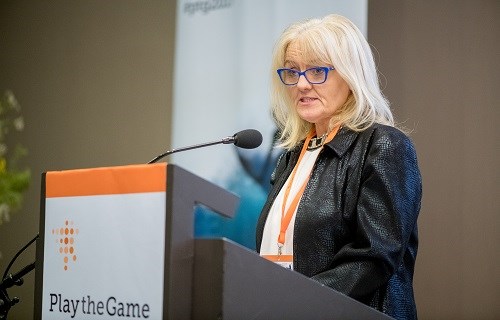“He had total power, total control over me…”

Karen M. Leach sharing her story at Play the Game 2017. Photo: Thomas Søndergaard/Play the Game
28.11.2017
By Mads A. WickstrømChildren are the future of sport. Without children there is no sport. What happens to children during their childhood might destroy their entire adulthood. As such, we must do all we can to protect children and prevent abuse. These were among the principal arguments made by a panel of experts during Monday’s session on sexual abuse at Play the Game 2017.
Karen M. Leach, former swimmer and now psychotherapist and counsellor, talked about surviving sexual abuse as a child and the negative consequences that followed.
Between the ages of 10 and 17, Leach was abused by her Irish Olympic coach. She spoke of the significant power a coach may have on a young athlete hoping to compete in the Olympic games.
“He had total power, total control over me. Over my swimming, over my life. He was so good at what he was doing. Everyone trusted him. Everyone believed him. Everything he said – what he wanted, he got,” Leach explained.
“You did exactly what he told you to do or else you were out,” she added.
“What happens to children may destroy their entire life as an adult – and some children just don’t make it,” Leach said.
Karen Leach’s story also testified to the fact that childhood abuse might have far-reaching consequences affecting not only the victims but also the victims’ family.
Mapping the extent of sexual abuse
What is the scale of sexual abuse in sport? Bettina Rulofs, senior lecturer and researcher at the German Institute of Sociology & Gender Studies sought, among other things, to provide an answer to this question through the project ‘VOICE’.
VOICE is an EU funded research project aiming at combatting sexual violence in sport by giving those affected by it a voice and a platform to speak out against sexual abuse. The project is facilitated in eight European countries, including a number of sport organisations.
The project includes a study of 1800 athletes in Germany. Rulofs found that 37% have experienced forms of sexual violence – from sexist jokes to abuse with physical contact. 70% of the victims were under the age of 18 when first experiencing sexual abuse.
Moreover, preliminary results of in-depth interviews with victims revealed a number of important insights into the realities and consequences of sexual violence including:
- Massive impact of sexual abuse on survivors and families;
- Victims had significant problems of finding support;
- Victims have had long periods of silence before disclosing their experience;
- A chilly climate in the regimes in which the victims trained – a “no pain, no gain” mentality.
Speaking on behalf of the Dutch National Olympic Committee, Geert Slot outlined the efforts made to obtain additional knowledge, research and insight into the nature and extent of sexual harassment by establishing an independent inquiry into sexual abuse in sport in the Netherlands.
The transformative power of journalism
Insights into the potential impact of journalism in the debate on sexual abuse was given by Willem Feenstra, journalist at Dutch newspaper De Volkskrant.
The presentation provided a number of examples to how investigative journalism can cause a breakthrough in the fight against child abuse.
For instance, reporting stories of sexual violence within youth academies have caused Dutch football clubs to take action.
Since 2016, a number of football clubs in the Netherlands have introduced measures to assist victims of sexual abuse including; offering of apologies, changing codes of conduct, opening hotlines for support and paid professional assistance to victims of sexual violence.
“Brave victims are role models. Without them, we don’t know anything about numbers. Whether it’s a politician, a bank director, or a trainer; it is our duty to make it visible when somebody misuses his powers,” concluded Feenstra.
Also presenting at the session, Sander Roege, consultant at PSV Eindhoven, explained that PSV Eindhoven is currently taking steps to combat sexual abuse by consulting victims on how to prevent further cases of sexual abuse.
Measures to prevent child abuse
George Nikolaidis outlined recent initiatives and the role of the European Council to protect children from sexual victimisation in sports.
Most prominent is the Lanzarote convention on Protection of Children against Sexual Exploitation and Sexual Abuse. The convention is signed and ratified by 42 European states and requires criminalisation of all kinds of sexual offences against children.
The convention sets out that states in Europe and beyond must take measures to prevent sexual violence, to protect child victims and to prosecute perpetrators.
“[…] there are a lot of initiatives that are currently unfolding involving the Council of Europe and other sport sector agencies and the European Union that could put the issue a bit forward and provide country-specific, sport-specific comprehensive plans on putting in place effective procedures to reassure everybody in the communities that children can enjoy their favourite sport without being exposed to dangers,” Nikolaidis concluded.

Read more about Play the Game 2017





